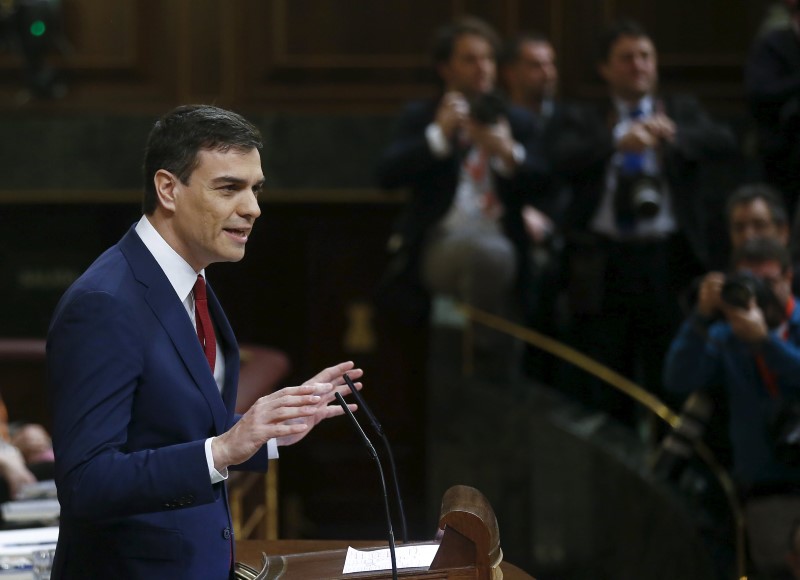By Sarah White and Blanca Rodríguez
MADRID (Reuters) - A coalition plan by Spanish Socialist leader Pedro Sanchez stumbled at the first hurdle on Wednesday as rivals on the left and right voted against it in parliament and set in motion a two-month countdown to avoid another election.
Spain has made little headway in resolving a political deadlock since a fragmented election result in December, when voters turned in their millions to anti-austerity Podemos ('We Can') and newcomer liberal party Ciudadanos ('Citizens').
All parties fell well short of an absolute majority in parliament and their jockeying for power has yet to yield a coalition with enough seats to get over the line.
The Socialists' plan to team with Ciudadanos failed, as expected, to win the endorsement of the 176 votes needed in the 350-seat parliament, paving the way for a tricky second vote later this week.
The defeat sets the clock ticking on a two-month window for parties to form a government, after which a new parliamentary election would be called, probably at the end of June.
Sanchez's proposal received only the 130 votes of his own party and Ciudadanos, after an acrimonious debate between leaders that set the tone for a fraught few weeks of further horse-trading between parties.
Politicians skimmed over policy issues with a volley of recriminations over who was to blame for the deadlock.
Acting Prime Minister Mariano Rajoy of the center-right People's Party (PP) branded the Socialist-Ciudadanos alliance a "bluff" and a threat to the national interest which sought to undo reforms his government brought in over the past four years.
Sanchez, whose Socialists were runners-up behind the PP in the Dec. 20 ballot, defended his bid to unblock the stalemate, condemning Rajoy for passing up the first opportunity to try to form a government.
Even natural allies are divided on many fronts, at a time when Spain's economic turnaround needs nurturing, notably to fix a labor market in which unemployment is above 20 percent.
Podemos also voted against Sanchez's bid, spurning his offer of measures to alleviate social inequalities as it pushes instead for an alliance between leftist forces.
"Your pact does not protect workers," Podemos leader Pablo Iglesias said, accusing Sanchez of aligning with the right.
ELECTION MODE
Sanchez needs to secure the most votes in a second ballot on Friday, rather than the 176 in favor, but that scenario is unlikely as the PP and Podemos together command 192 seats.
No candidate for prime minister has failed in both confidence votes since Spain returned to democracy in the mid-1970s.
Rajoy's comments on Wednesday raised questions as to whether he could persuade the Socialists to back him as leader in any subsequent votes in the coming weeks. With 123 seats to its name, the PP is also stuck for allies.
"Rajoy came across as someone already in election mode," said Vincenzo Scarpetta, a political analyst at the Open Europe think tank in London.
"Based on the debate it has become very difficult to envisage a breakthrough," he said, though Scarpetta said the countdown to new polls could induce some parties to make more concessions if they feared a rout.
An uneven recovery from the economic crisis partly fueled the political backlash in Spain, echoing an upset in Portugal last year that resulted in a fragile leftist coalition. A similar story unfolded in Ireland last week, with an inconclusive election.
Corruption scandals have also tainted mainstream Spanish parties, especially the PP, and are likely to keep weighing on negotiations.
Sanchez said Rajoy was becoming "a blockage for the renewal" of his party. Even Ciudadanos, which praised the PP for helping reboot the economy, rounded on the former premier.

"You're not a credible (person) to lead this new political phase," said leader Albert Rivera.